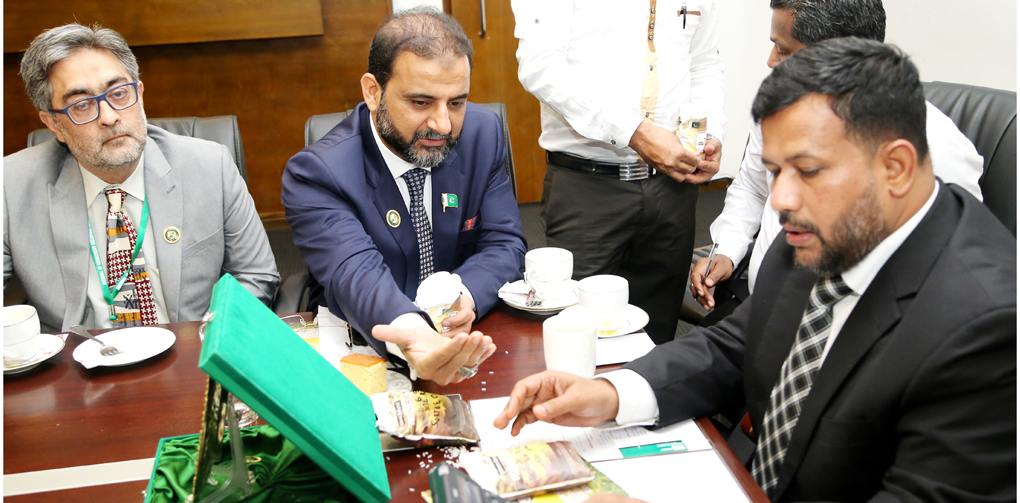
Pakistan’s influential and sole rice exporters grouping urged the Sri Lankan Trade Minister to slash import tax slapped in Colombo on their shipments on 12 December. They also called for doubling of Pakistani basmati rice intake by Sri Lanka.
“Though rice imported from other countries to Sri Lanka are taxed only Sri Lankan cents 25 per kilo (SL Rs. 0.25) this is not so for rice coming from Pakistan” said the Chief Executive of Rice Exporters Association of Pakistan Rafique Suleman, addressing the Minister of Industry and Commerce of Sri Lanka Rishad Bathiudeen at the Ministry of Industry and Commerce, Colombo 3.
Visiting Chief Executive Suleman was meeting Minister Bathiudeen with his 11-man Pakistani rice exporters’ delegation on the eve of 12 December. Minister Bathiudeen was joined by his Ministry Secretary KDN Ranjan Ashoka. “Many countries around the world are discouraging and stopping their rice exports. Pakistan is the only country in the world that does not restrict its rice exports. We, the Pakistani private sector control our country’s total rice exports and no controls are imposed by the government on us. The Rice Exporters Association of Pakistan (REAP) has been doing business with Sri Lanka since 1996, supplying to state owned CWE and private sector” said Visiting Chief Executive Suleman and added: “Though other rice imported to Sri Lanka are taxed only 25 Sri Lankan cents (Rs. 0.25) per kilo this is not so for rice coming from Pakistan. Basmati rice is taxed SL Rs 50 per kilo. What we are unhappy is even each kilo of Pakistani non-Basmati and long grain rice imported to Sri Lanka are subjected to a comparatively higher import tax of SL Rs 50. We call you to reconsider and reduce this high import tax imposed on our non-Basmati rice. Our PK 386, and C9 varieties are non-Basmatis that are regularly landing in Sri Lanka but they are also classified as “Basmati” here perhaps by mistake, and taxed at same Basmati rate of SL Rs 50 per kilo, which needs to be rectified. We also urge to increase Sri Lanka’s quota of duty-free basmati imports to Sri Lanka, if possible double it to 12000 MT.”
According to the Department of Commerce under Minister Bathiudeen, under the Pakistan-Sri Lanka FTA, a mechanism was agreed in 2007 at the First Ministerial meeting between two countries to facilitate the import of basmati rice. Accordingly, a total of 6000 MT Basmati rice per year (on duty free) is allowed to be imported from Pakistan.
Minister Bathiudeen welcomed REAP’s interest to enhance ties with Lankan market. “Pakistani rice varieties have been sold in Sri Lankan market for a long time and many of our consumers are familiar with them” said Minister Bathiudeen and added: “Your demands on import tax and quota issues appear to be reasonable -Still they also impact on bilateral tariff agreements as well as domestic food security and even our local rice farmers well-being; Therefore I will have to consult all these stakeholders –including my officials, and higher levels before proceeding. I and my Ministry will review the issues raised and call for stakeholder consultations next.”
In 2016, 3% of all imports from Pakistan to Sri Lanka are Pakistani rice at US $ 9.35 Mn (declining from $ 12 Mn in 2015). Rice was the eighth product imported to Sri Lanka from Pakistan in 2016 (number one was cotton, at $ 75 Mn followed at second by Portland cement at $ 65 Mn).
REAP is the collective of Pakistan’s largest privately owned rice exporting firms. Almost 800 Pakistani rice exporters are under REAP. The voice of REAP is influential-in fact, REAP membership is compulsory for all rice exporters of Pakistan.


